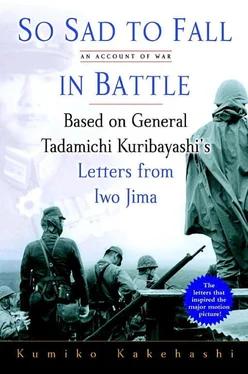The same vows were found in other notebooks discovered on the island. According to a field diary discovered after the war, the soldiers used to recite the vows together at morning assemblies and other occasions.
The text and Japanese ideograms in the vows I quote from differ slightly from the “Courageous Battle Vows” in the official history. This is probably because each unit received a mimeographed copy from which the soldiers copied the six clauses into their own notebooks.
Andô worked hard collecting the bones and possessions of the dead from Iwo Jima while it was still occupied by the United States. He later said in his memoirs that the soldiers probably “regarded the vows as an article of faith, and, even after their bodies had rotted, were still reluctant to let go of them.”
Bill D. Ross, who took part in the invasion of Iwo Jima as a marine sergeant combat correspondent, comments in his book Iwo Jima: Legacy of Valor on how many of the Japanese soldiers had copies of the slogans: “Marines found copies in the first destroyed bunkers on the beaches, and they would find others in caves, tunnels, pillboxes and other bunkers—and on the bodies of the enemy dead—everywhere on the island.”
Over the eight months leading up to the landing of the U.S. forces, the Japanese soldiers read the vows over and over to imprint them in their minds. Kuribayashi urged his men to fling themselves against the enemy tanks clutching bombs, to charge into the enemy lines and kill them, to work on their shooting skills and shoot the enemy dead. You must not die, he said, until you have killed ten people, and you must keep fighting even if all your brothers have been wiped out.
This was not an order or a directive. It was an oath.
Kuribayashi did not say “Every soldier must;” he used the expression “We shall.” The soldiers, in other words, were not being forced to do anything: When they fought to the death, they did so of their own volition. By implanting determination and pride through the vows, Kuribayashi was trying to sustain the fighting spirit of his soldiers, who were already worn out by their defense-building duties.
Looking ahead, the more than twenty thousand Japanese soldiers on the island clearly did fight the battle in accordance with the “Courageous Battle Vows.” Their method of fighting was ruthless—incredibly so—and it terrified the Americans.
Even when the organized fighting was over and there were no officers left to give orders, the surviving soldiers evolved into guerrillas hiding out in caves. The last two Japanese soldiers didn’t actually surrender until January 6, 1949—three and a half years after the end of the war, and almost four years after the fall of Iwo Jima itself.
KURIBAYASHI WAS A COMMANDER who “overflowed with warmth;” he was a commander who refused to eat any of the precious fresh vegetables brought over from the mainland, preferring instead to distribute them among his men. Yet this same Kuribayashi created slogans that seem almost too gruesome for our modern-day sensibilities. At the same time, they do show how Kuribayashi saw his role, and what sort of battle he was planning to fight. He knew the battle for Iwo Jima would not allow anyone the luxury of “fighting bravely and perishing heroically.”
A single reading of the “Courageous Battle Vows” makes one thing clear: “achieving victory” was not the aim; it was “not to be defeated” for as long as possible. That was the goal for which everyone was to shed their blood down to the very last drop. Not being defeated was what the battle of Iwo Jima was all about.
Kuribayashi chose guerrilla warfare as his method—hiding underground, waiting for the enemy, and then launching surprise attacks; staying alive by any means possible in order to kill just one more of the enemy. His men would need extraordinary reserves of mental strength to execute this strategy. The “Courageous Battle Vows” were designed to foster that mental strength and reinforce their determination.
The battle of Iwo Jima was distinguished by appalling suffering. One soldier who survived commented in his memoirs: “There is a saying that ‘the way of the warrior is to die’ and we so wanted it to be a battle based on that ethos.” To die a heroic death may have been the proper thing for a samurai, but Kuribayashi would not allow either his men or himself to indulge in that kind of ritualistic behavior.
He strictly forbade so-called banzai charges, those all-out attacks on enemy lines that ended in the annihilation of the attackers, and his men faithfully obeyed his orders.
Bill D. Ross describes the way the Japanese soldiers fought on Iwo Jima in the following passage of his book.
Each attack was organized—not the screaming bedlam of banzais of other invasions, but missions with a purpose. Kuribayashi’s troops were adhering to his “courageous battle vows” to harass the Americans “until we are destroyed to the last man.”
During the merciless battle, the thought of bringing it all to an end with one final charge rather than fighting on through wounds, hunger, and thirst was tempting. On Iwo Jima, after all, victory or survival were not options. It was even thought that indulging the men in their final hope and letting them go out in a blaze of glory was a way for the commander to show the “compassion of the Samurai.” But Kuribayashi was resolute: on this island not a single soldier was to be allowed to die in vain.
This decision was not based on any sort of humanism, but on hard-headed calculation.
Kuribayashi knew that he and his men were going to die, but he had calculated how to extract the maximum benefit from his life and those of his soldiers. Their role was to save the lives of the civilians back on the mainland, and to save as many of them as possible.
In the letters Kuribayashi wrote to his family, he repeatedly emphasized that were Iwo Jima to fall to the enemy, Tokyo would be subjected to intense air raids. At this stage, the air raids on the mainland were still only targeting facilities and factories connected to the military, but Kuribayashi warned them that if Iwo Jima were captured after Saipan, where B-29s were already being stationed, the cities of Japan would all have large-scale air raids visited on them.
In a letter dated September 27, 1944, to his son, Tarô, and his eldest daughter, Yôko, he said:
Tokyo is not experiencing air raids now, but if the island that I am now defending ends up getting captured by the enemy, then it’s sure to start being bombed around the clock. (Just as the place I’m now in started getting raids right after the capture of Saipan.)
The enemy counterattack is becoming fiercer and fiercer recently. It’s only a matter of time before they come and attack the place where I am. When that happens, if we can’t hold out, the next stage will be air raids on Tokyo.
The awfulness, damage, and chaos of air raids are inexpressible and beyond the imagination of people living peaceful lives in Tokyo.
To his wife, Yoshii, on January 21, 1945:
There are now 140 or 150 B-29 planes based on Saipan. By around April, that number will be 240 or 250, and by year-end it’s likely to rise to about 500 planes—meaning that there will be that many more air raids than now. On top of that, if the island I’m on gets captured, there’ll be an increase of several hundred enemy planes, and the air raids on the homeland will be many times more savage than now. In the worst case, the enemy may land on the beaches of Chiba and Kanagawa prefectures and penetrate near to Tokyo.
It was the desire to delay the B-29 raids and the resulting civilian casualties for as long as he could that made Kuribayashi opt for a war of attrition, no matter what the cost.
He also seems to have hoped that the army command would proceed with negotiations to bring the war to an end while he kept the Americans pinned down and played for time.
Читать дальше












